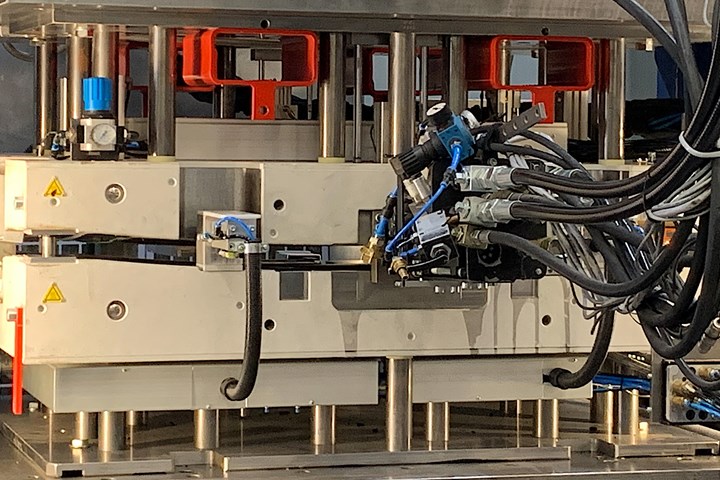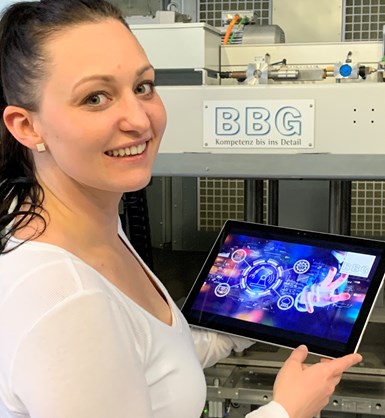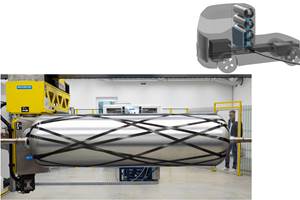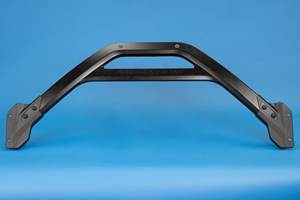Composites mold manufacturer, BBG, is finalist for Germany’s best toolmaker 2020
Smart molds for Industry 4.0 applications key to its recognition in “Excellence in Production” competition.

Photo Credit: BBG
It was reported on Nov. 24 that BBG GmbH & Co. KG (Mindelheim, Germany), a manufacturer of molds, machinery and plants, presented smart molds for use in Industry 4.0 applications and in smart factory environments. The company is among the finalists in the "Excellence in Production" competition for Germany’s best toolmaker in 2020. BBG’s molds are designed and developed to process polyurethane, PVC, TPE and other elastomers, as well as a wide range of composite materials. This includes production processes such as PUR-CSM (PUR Composite Spray Molding), LFI (Long Fiber Injection), RTM (Resin Transfer Molding), SMC (Sheet Molding Compound) or GMT (Glass Mat-reinforced Thermoplastics) (see “BBG presents self-closing HP-RTM molds for CFRP compact hydrogen tank production”).
According to BBG, the smart molds, can be used, for example, in encapsulation molds for refining glass and polycarbonate sheets with polyurethane, or for manufacturing components on the basis of the PUR-RIM process. Furthermore, it is said to be suitable for all types of molds used to produce safety-relevant or Class A components that place high demands on the manufacturing process and documentation. Smart molds also facilitate fully automated production lines. Typical customers include manufacturers from the automotive, pharmaceutical, and aerospace industries, who are required to document the production data of components due their obligation to produce proof of production.
According to BBG, smart molds reduce the cost for material and energy consumption while increasing productivity and process accuracy (see “Composites 4.0: Digital transformation, adaptive production, new paradigms”). In addition, the process data required for documentation can be gathered for every component and can be stored long-term. To this end, the molds are equipped with a large number of sensors that collect data on process parameters such as temperature, flow velocity and pressure during the entire manufacturing process. Special sensors developed by BBG are also able to detect metallic inserts in steel molds reliably, ensuring validated measurements even with the panes inserted.
Further, BBG says information can be processed on-site at the mold or forwarded to the higher-level control systems of other production lines. Any deviations from the target values specified are displayed and can be corrected immediately. Furthermore, the correct sequence and the performing of work steps can be specified and can be controlled by the mold itself. In this way, an operator always knows that the work steps have been carried out correctly in the specified order, and which ones will be next.

The data collected in intelligent molds can be processed and displayed directly on-site or forwarded to the control systems of other production lines, such as mold carrier systems or encapsulation equipment. Photo Credit: BBG
“Smart molds are at the top of our wide range of products, which starts with simple and cost-efficient prototyping molds,” says Hans Brandner, the managing partner. “What the customer needs is what counts for us. We develop the right mold customized to meet every requirement.”
According to Brandner, BBG’s strict focus on customer benefit is also key for the renewed success at the "Excellence in Production" competition. BBG has been nominated this year for the second time after 2018, as one of the best toolmakers in Germany. In the category "External toolmaker with fewer than 50 employees,” BBG once again made it to the top three. The winner was announced at the online award ceremony on Nov. 18.
“Excellence in Production" is organized by the Werkzeugmaschinenlabor WZL of the Rheinisch-Westfälische Technische Hochschule (RWTH) and the Fraunhofer Institute for Production Technology, which are both headquartered at Aachen,Germany. Around 300 specialized companies and in-house corporate departments regularly participate in the competition, which has been organized every year since 2003, and compete against each other in four different categories.
Related Content
Carbon fiber, bionic design achieve peak performance in race-ready production vehicle
Porsche worked with Action Composites to design and manufacture an innovative carbon fiber safety cage option to lightweight one of its series race vehicles, built in a one-shot compression molding process.
Read MoreCryo-compressed hydrogen, the best solution for storage and refueling stations?
Cryomotive’s CRYOGAS solution claims the highest storage density, lowest refueling cost and widest operating range without H2 losses while using one-fifth the carbon fiber required in compressed gas tanks.
Read MoreAutomotive chassis components lighten up with composites
Composite and hybrid components reduce mass, increase functionality on electric and conventional passenger vehicles.
Read MorePlant tour: Joby Aviation, Marina, Calif., U.S.
As the advanced air mobility market begins to take shape, market leader Joby Aviation works to industrialize composites manufacturing for its first-generation, composites-intensive, all-electric air taxi.
Read MoreRead Next
Developing bonded composite repair for ships, offshore units
Bureau Veritas and industry partners issue guidelines and pave the way for certification via StrengthBond Offshore project.
Read MoreAll-recycled, needle-punched nonwoven CFRP slashes carbon footprint of Formula 2 seat
Dallara and Tenowo collaborate to produce a race-ready Formula 2 seat using recycled carbon fiber, reducing CO2 emissions by 97.5% compared to virgin materials.
Read MoreVIDEO: High-volume processing for fiberglass components
Cannon Ergos, a company specializing in high-ton presses and equipment for composites fabrication and plastics processing, displayed automotive and industrial components at CAMX 2024.
Read More















.jpg;maxWidth=300;quality=90)










